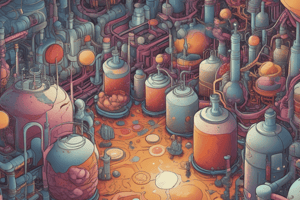Podcast
Questions and Answers
Which microorganisms are primarily associated with microbial biotechnology?
Which microorganisms are primarily associated with microbial biotechnology?
- Fungi, protozoa, and bacteria
- Algae, bacteria, and viruses
- Viruses, protozoa, and fungi
- Bacteria, yeast, and molds (correct)
What is the primary role of fermentation in microbial biotechnology?
What is the primary role of fermentation in microbial biotechnology?
- Isolation of pure bacterial strains
- Conversion of sugars to acids, gases, or alcohol (correct)
- Energy generation through oxygen consumption
- Production of genetic materials
How does genetic engineering relate to microbial biotechnology?
How does genetic engineering relate to microbial biotechnology?
- It involves the study of genetic mutations in microbes
- It focuses solely on plant genes
- It applies only to animal biotechnology
- It uses microorganisms to produce genetically modified organisms (correct)
Which aspect is crucial when considering safety in microbial biotechnology?
Which aspect is crucial when considering safety in microbial biotechnology?
What factor does not influence microbial activity in the industry?
What factor does not influence microbial activity in the industry?
What is a significant application of nanotechnology in microbial biotechnology?
What is a significant application of nanotechnology in microbial biotechnology?
Which type of fermentation is not typically utilized in microbial biotechnology?
Which type of fermentation is not typically utilized in microbial biotechnology?
What is a common ethical concern associated with the use of microorganisms in biotechnology?
What is a common ethical concern associated with the use of microorganisms in biotechnology?
What is the primary purpose of a fermenter in bioprocessing?
What is the primary purpose of a fermenter in bioprocessing?
Which of the following is a characteristic of secondary metabolism?
Which of the following is a characteristic of secondary metabolism?
What conditions must be controlled within a fermenter for optimal penicillin production?
What conditions must be controlled within a fermenter for optimal penicillin production?
Which of the following best describes the economic requirements for a fermenter?
Which of the following best describes the economic requirements for a fermenter?
Which source of media consideration is essential for fermentation processes?
Which source of media consideration is essential for fermentation processes?
What distinguishes primary metabolites from secondary metabolites in fermentation?
What distinguishes primary metabolites from secondary metabolites in fermentation?
Which of the following penicillin-related compounds is NOT classified as a primary metabolite?
Which of the following penicillin-related compounds is NOT classified as a primary metabolite?
Flashcards
Microbial Biotechnology
Microbial Biotechnology
The use of microorganisms (like bacteria, yeast) to create products or processes.
Fermentation
Fermentation
A process that uses microorganisms to create food and other products.
Genetically Modified Products
Genetically Modified Products
Products made by altering the genes of living organisms.
Enzymes
Enzymes
Signup and view all the flashcards
Molecular Biology Techniques
Molecular Biology Techniques
Signup and view all the flashcards
Importance of Bacteria in Industry
Importance of Bacteria in Industry
Signup and view all the flashcards
Importance of Molds in Industry/Medicine
Importance of Molds in Industry/Medicine
Signup and view all the flashcards
Fermentation Process Principles
Fermentation Process Principles
Signup and view all the flashcards
Penicillin production method
Penicillin production method
Signup and view all the flashcards
Fermenter purpose
Fermenter purpose
Signup and view all the flashcards
Fermenter considerations
Fermenter considerations
Signup and view all the flashcards
Media's role in fermentation
Media's role in fermentation
Signup and view all the flashcards
Primary vs. Secondary Metabolism
Primary vs. Secondary Metabolism
Signup and view all the flashcards
Penicillin characteristics
Penicillin characteristics
Signup and view all the flashcards
Antibiotics like penicillin
Antibiotics like penicillin
Signup and view all the flashcards
Study Notes
Microbial Biotechnology Overview
- Microbial biotechnology utilizes microorganisms for industrial and medical applications.
- Dr. Eman Owis is a lecturer in Microbial Biotechnology at Mansoura University and has a PhD from Göttingen University.
- Key processes in microbial biotechnology include fermentation, genetic engineering, and nanotechnology.
Fermentation
- Fermentation is used to produce various products, including pharmaceuticals, enzymes, and industrial chemicals.
- Fermenters provide a contained, controlled, and homogeneous environment for optimized fermentation processes.
- Important factors for fermenter design include cost, reliability, and safety.
- The specific design parameters depend on the purpose of the fermenter.
Penicillin Production
- Penicillin is a group of antibiotics produced by the Penicillium fungi.
- It is not a single compound, but a group of closely related compounds (e.g. Amoxicillin, Ampicillin, Phenoxymethylpenicillin).
- Alexander Fleming discovered penicillin in 1928.
- Later, Howard Florey and Ernst Chain purified and produced penicillin on a large scale in 1941 and 1943, respectively.
- This was instrumental in treating WWII casualties.
Penicillin Production Process
- Medium: The medium for Penicillin production commonly contains Corn Steep Liquor, Glucose, MgSO₄, K₃PO₄, and sodium nitrates to provide essential ions for the fungus's metabolic activity.
- Heat Sterilization: The medium is sterilized at high heat and pressure (121°C at 30 psi, or twice atmospheric pressure). This is usually done in a holding tube or together with the fermenter.
- Fermentation: Fermentation is typically carried out in a fed-batch manner, slowly adding nutrients over time. This process is conducted at temperatures in the range of 20-24°C and pH of 6.5. The pressure in the bioreactor is significantly higher than atmospheric pressure (1.02 atm) to minimize contamination. Stirring is crucial for homogeneous distribution of the culture medium and is typically maintained at 200 rpm.
- Seed Culture: Penicillium chrysogenum spores are first grown in a liquid medium until sufficient for inoculation into the fermenter. During this stage, the medium is constantly aerated and agitated. Parameters such as pH, temperature, stirring speed, and dissolved oxygen are regularly monitored. Penicillin secretion begins typically after 40 hours of seed culture. The growth process typically concludes after 7 days, with consequent rise in pH to 8.0 or above. At this time, penicillin production stops.
- Biomass Removal: The biomass is separated from the penicillin-containing medium using a rotary vacuum filter.
- Solvent Addition: Organic solvents (e.g., amyl acetate or butyl acetate) are added to dissolve the penicillin from the filtrate.
- Centrifugation: The penicillin, now in solution, is separated from the other solids by centrifugation.
- Extraction: The penicillin solution undergoes further extraction stages including mixing with phosphate buffers and chloroform solution, and finally, with an ether solution to obtain high penicillin concentration and purity. The final product (Penicillin G) is obtained in a stable powder form as Sodium salt, after being combined with sodium bicarbonate.
- Drying: The penicillin is dried, removing the remaining moisture, in a fluidized bed dryer.
- Storage: Penicillin is stored in containers in a dry environment.
Media Formulation
- Media should provide all necessary elements for cell synthesis, and desired product formation
- Should be cost-effective, and foster a favorable culture environment
- The composition for penicillin fermentation includes various nutrients and chemicals like glucose, various salts, and other components.
Primary and Secondary Metabolism
- Primary metabolism involves essential metabolic processes like energy production and cell biosynthesis.
- Secondary metabolism is the production of special metabolites (like penicillin) not directly involved in energy production but often in defense mechanisms or acting as signaling molecules to compete with other microorganisms. Penicillin production in Penicillium chrysogenum is an example.
Studying That Suits You
Use AI to generate personalized quizzes and flashcards to suit your learning preferences.




